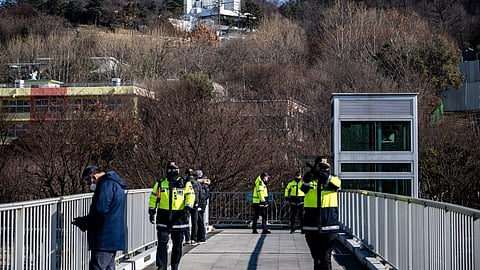
- NEWS
- the EDIT
- COMMENTARY
- BUSINESS
- LIFE
- SHOW
- ACTION
- GLOBAL GOALS
- SNAPS
- DYARYO TIRADA
- MORE

Impeached South Korean President Yoon Suk Yeol remained defiant inside his residence, resisting arrest for a third day on Thursday after vowing to "fight" authorities who seek to question him over his failed martial law bid.
The embattled leader issued the bungled declaration on December 3, which led to his impeachment and left him facing arrest, imprisonment, or, at worst, the death penalty.
Supporters and opponents of Yoon have since camped outside his presidential residence, while members of his security team have blocked attempted police raids in a dramatic standoff.
Yoon has remained unrepentant, issuing a defiant message to his base just days before an arrest warrant expires on January 6.
"The Republic of Korea is currently in danger due to internal and external forces threatening its sovereignty, and the activities of anti-state elements," he said in a statement circulated among protesters, which his lawyer Yoon Kab-keun confirmed to AFP.
"I vow to fight alongside you to the very end to protect this nation," he added, saying he watched the hundreds-strong protest on Wednesday evening via a YouTube live stream.
Yoon Kab-keun confirmed to AFP that the impeached leader remained inside the presidential compound.
"The president is at the (official presidential) residence," he said.
Opposition lawmakers quickly condemned Yoon Suk Yeol's defiant message as inflammatory, with Democratic Party spokesperson Jo Seoung-lae calling him "delusional" and accusing him of trying to incite clashes.
The suspended president's legal team has filed for an injunction to block the warrant, describing the arrest order issued on Wednesday as "an unlawful and invalid act."
Corruption Investigation Office (CIO) chief Oh Dong-woon warned that anyone obstructing authorities from arresting Yoon Suk Yeol could face prosecution.
Along with the summons, a Seoul court issued a search warrant for his official residence and other locations, a CIO official told AFP.
The presidential security service's official stance has been to treat the warrants with due process.
It remains unclear how many guards are stationed with him, but they have blocked searches of his office and residence.
They have cited two articles in South Korea's Criminal Procedure Act that prohibit seizure from locations containing official secrets, without consent from the person in charge.
South Korean officials have previously failed to execute similar arrest warrants for lawmakers in 2000 and 2004, due to party members and supporters blocking police for the seven-day period the warrants were valid.
However, discussions between prosecutors and police about Yoon Suk Yeol's arrest continue amid the political crisis that briefly saw the country revert to the dark days of military rule.
The martial law order, which Yoon Suk Yeol claimed was aimed at eliminating "anti-state elements," lasted only a few hours.
Armed troops stormed the national assembly building, scaling fences, smashing windows, and landing by helicopter. However, the president quickly made a U-turn after lawmakers rushed to parliament to vote it down.
He was then stripped of his presidential duties by parliament and now faces criminal charges of insurrection.
Yoon Suk Yeol has since refused summonses for questioning three times and has doubled down on claims that the opposition is in league with South Korea's communist enemies.
Supporters have flocked to Seoul to back him in the wake of his refusal, spewing vitriol at police and waving anti-impeachment placards.
A constitutional court will rule on whether to uphold his impeachment.
The turmoil deepened late last week when his replacement, Han Duck-soo, was also impeached by parliament for failing to sign bills for investigations into his predecessor.
Finance Minister Choi Sang-mok has been installed as acting president and pledged to do all he can to end the political upheaval.
He has since decided to appoint two new judges to the constitutional court, a key demand of the opposition, but was criticized by Yoon Suk Yeol's staff for overstepping his powers.
